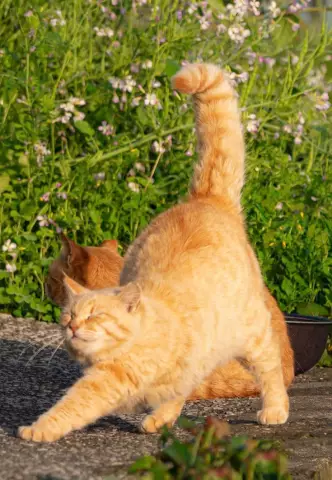- Author Delia Mathews mathews@animalspeace.com.
- Public 2024-01-08 23:30.
- Last modified 2025-01-22 15:45.
Feeding castrated cats is not very different from what is suitable for their non-castrated counterparts, and yet there are some nuances. After the operation, cats often become inactive, calm and, while maintaining the same volume of food, they quickly gain weight.

Instructions
Step 1
To help your animal avoid obesity, reduce food portions or choose a lower-calorie diet. If it is impossible to resist the sight of a sad pet by an empty bowl, feed him more often and little by little, or provide physical activity - play with the cat every day, make him run and jump, buy or make more toys.

Step 2
If your cat eats ready-made food, choose professional, or better - specialized, designed specifically for neuter. Preventive food for castrated cats prevents the development of urolithiasis; manufacturers offer a wide selection from budget feed to premium. There are also medicinal ones (for cats already suffering from urinary stones), but they should not be given to healthy animals. Do not forget that if a cat eats dry food, he needs to drink often and a lot; switch to canned food if the cat rarely drinks. It is better not to give economy-class food to a castrated cat - their quality is low, it is difficult to call them fully balanced.

Step 3
If you choose to feed with natural products, the main rule is never to feed fish. Fish rich in calcium, magnesium and phosphorus lead to the formation of stones in the urinary system. Urolithiasis is life-threatening for the animal, and after castration, cats are especially susceptible to this disease. A cat can get the required amount of microelements from other food.

Step 4
Be sure to feed your cat raw meat - poultry, beef. It is advisable to cut the meat into large pieces - this is necessary for the health of the teeth. Neutered cats tend to build up plaque and tartar on their teeth, and chewing on raw meat cures these problems. It is better not to give chicken skin - it is very poorly digested. You can give offal (liver, heart, lungs). Try to include fermented milk products (kefir, cottage cheese) in your diet. Cereal cereals (oatmeal, buckwheat) and vegetables are highly desirable. Do not give your cat smoked meats, sausages, or any other treats from your table - fatty and salty foods are harmful to the liver and kidneys of animals.






